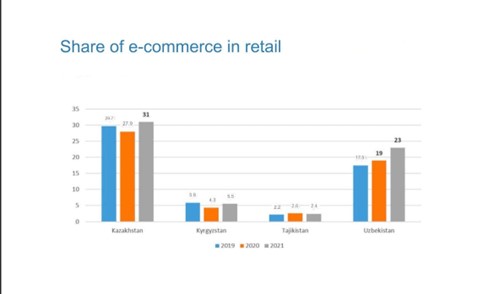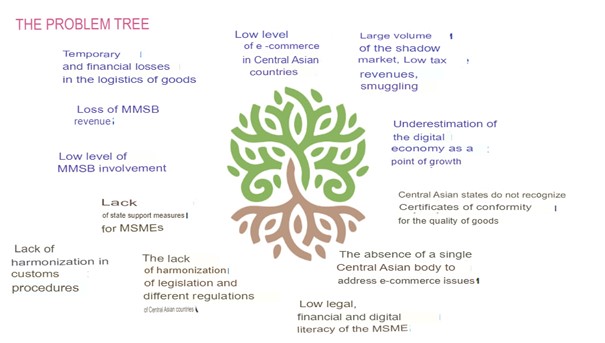The Daryo.uz news service of Uzbekistan published on 13 March 2024 a report on the ecommerce situation in Central Asia.
Here, we are reproducing the report in full:
Central Asian countries consider establishing dedicated bank accounts for e-commerce transactions
The e-commerce sector in Central Asia reached a value of $8bn in 2022, as per IMARC Group, a global research and consulting firm specializing in market analysis. Projections indicate a growth rate of 25.4% over the next five years.
 The surge in e-commerce can be attributed to the impact of the COVID-19 pandemic, which accelerated the adoption of online platforms. Furthermore, expanding internet infrastructure and improved accessibility for both urban and rural populations are facilitating the gradual yet consistent expansion of the market.
The surge in e-commerce can be attributed to the impact of the COVID-19 pandemic, which accelerated the adoption of online platforms. Furthermore, expanding internet infrastructure and improved accessibility for both urban and rural populations are facilitating the gradual yet consistent expansion of the market.
However, e-commerce experts in Central Asia argue that governmental institutions have not kept pace with such advancements. They advocate for the enactment of a dedicated law to regulate the rights and responsibilities of all stakeholders involved. Countries that have implemented such legislation rushed through the process, resulting in regulations that are deemed rudimentary and incomplete, according to experts.
For instance, Tajikistan has established a separate Agency for Innovation and Digital Technologies. Economists from across Central Asia have outlined the current challenges facing the industry and proposed solutions aimed at addressing them. Their findings and recommendations will be presented during the upcoming B5+1 forum in Almaty scheduled for March 14-15. [We have already reported on this in our report ‘E-Commerce in Tajikistan readying to bloom,’ published at this link – https://www.newscentralasia.net/2024/05/17/e-commerce-in-tajikistan-readying-to-bloom/]
Volume of e-commerce market in CA equals to $8bn
In May 2023, an industry subgroup B5+1 was created, which included representatives of regional NGOs and businesses. The working group included representatives of five Central Asian countries: Kazakhstan, Kyrgyzstan, Uzbekistan, Tajikistan and Turkmenistan.
Over the course of the year, experts managed to achieve some results in collaboration with international institutions, participation in the development of the National Business Agenda, explored the problems of legislative regulation, and presented their proposals to the governments of Central Asian countries.
The growing population of the region creates a capacious sales market and a growing pool of labor resources. Central Asia’s population of 77mn continues to grow at almost 2% annually. As per the UN estimates, until 2040, annual demographic growth in the region will average 1.1%. Demography is on the side of growth of the economies of the Central Asian states.
As per KPMG Caspian (2022), the e-commerce market in Kazakhstan is expected to grow by 19%, or $5bn, in 2023. As for the Uzbekistan market, it is predicted that by 2026 it will reach $1bn.
 Chairman of the Board of the non-profit organization Techno Women, founder of the Digital Transformation Foundation Aziza Shuzheeva proposes to sign an Agreement on the development of e-commerce at the level of heads of state of Central Asia. The presence of the document will give a real impetus to the harmonization of legislation and regulation.
Chairman of the Board of the non-profit organization Techno Women, founder of the Digital Transformation Foundation Aziza Shuzheeva proposes to sign an Agreement on the development of e-commerce at the level of heads of state of Central Asia. The presence of the document will give a real impetus to the harmonization of legislation and regulation.
“It is necessary to develop and adopt regulations that will ensure the protection of the rights of consumers and businesses in the online environment, as well as ensure the security of online payments. It is necessary to develop the customs infrastructure and integrate information systems in the clearance of goods in order to radically reduce downtime. The government can provide financial support and training for entrepreneurs who want to develop in the field of e-commerce. It is also very important to create simplified and understandable tax administration for merchants, sellers, artisans and other representatives of MSMEs,” says Aziza Shuzheeva.
These and other equally important proposals will be discussed at the B5+1 forum in Almaty on March 14-15. [A report on the outcome of the forum is available at this link – https://astanatimes.com/2024/03/almaty-hosts-inaugural-b51-business-forum/]
Barriers hindering development of e-commerce
Along with the positive indicators, there are difficulties due to which the e-commerce market is not reaching its full potential.
Barriers in e-commerce:
- Physical logistics (insufficient number of flights, railways, etc. in the region);
- E-commerce is not keeping pace with the growth of Internet access;
- Devaluation of national currencies and rising commodity prices are considered a risk;
- E-commerce as an area of trade suffers from low levels of public trust;
- Poor data protection;
- The process of licensing and taxation has not been established.
 Knowing all the problems in each individual Central Asian country, it became easier to work with barriers. For example, several countries have already adopted the Electronic Commerce Law. Kyrgyzstan was one of the first to develop the law.
Knowing all the problems in each individual Central Asian country, it became easier to work with barriers. For example, several countries have already adopted the Electronic Commerce Law. Kyrgyzstan was one of the first to develop the law.
“We have three proposals on the conceptual apparatus itself. For example, terms such as: “e-commerce operator”, “customs warehouse operator”, “market security”. We have a law on consumer protection, a law on advertising, and a law on electronic commerce, that is, the working group is working on its recommendations to bring them all into line with the requirements of the current time,” says the national expert of the IBECA program in the Kyrgyz Republic, former Ambassador of the Kyrgyz Republic to the United States Muktar Dzhumaliev.
For reference, in Kyrgyzstan 5.2mn people have access to the Internet, 2.7mn people are active users of social networks, and 8.9% use mobile connections to access the Internet.
Experts also note the problems of border crossings and the issue of transport infrastructure. Government support would be helpful in improving the regulatory framework of the entire region. For example, banks have already begun cooperation: N-Bank of Kyrgyzstan and Caspian Bank of Kazakhstan have entered into an agreement, that is, the applications of two banks from different countries support each other. Now in Kyrgyzstan, almost any payment can be made using the N-banking application online.
First agency for e-commerce
In Tajikistan, over the past 2 years, the state has been actively developing e-commerce: in 2022, a law on e-commerce was adopted, and then the president issued a decree on measures to expand non-cash payments for government services. Now all fiscal payments, as well as utilities, have been transferred to direct non-cash payments. This type of payment in the form of electronic wallet cards in Tajikistan has grown several times over the past five years.
At the beginning of 2024, a government decree established a new Agency for Innovation and Digital Technologies, one of its main directions is the development of e-commerce. So far, Tajikistan is the only country that has created a separate agency to regulate rights and obligations in this industry.
“Our e-commerce law does not have mechanisms that could regulate rights and protect against fraudulent, inappropriate services and goods. There is a local problem: courier services and deliveries are regulated by one resolution, and they are equal to postal services. Entrepreneurs need to go through all the mechanisms and meet the minimum requirements for postal activities. We believe that it is necessary to put forward a more humane and simplified licensing option for those involved in e-commerce. This will affect the development of the market, because the more such services there are, the more competition and quality will improve,” Alisher Shernazarov, national expert of the IBECA program in Tajikistan, spoke about the problems in his country.
Separate bank accounts for e-commerce transactions
In Uzbekistan, a law introduced in 2022 limited the rights of entrepreneurs. For example, members of the working group noted difficulties in placing their online stores on foreign servers. Local servers have insufficient infrastructure, quality and level of services. On the one hand, legislators did this for the sake of developing local servers but did not provide for the capacity and now the law has a negative impact on businessmen.
Transport logistics is quite well-developed in Uzbekistan. The network covers the entire country, as well as high-quality access to the Internet. However, there are shortages in physical logistics, a lack of warehouses, and a change in the purpose of land plots that are needed for marketplaces. Issues regarding data protection and consumer rights protection have not been resolved.
“We propose to introduce special bank accounts for e-commerce businesses. We have seen this practice in several countries, including Kyrgyzstan. In special accounts, entrepreneurs keep records only of e-commerce transactions. To divide volumes and turnover between e-commerce and traditional trade. In Uzbekistan, there are a number of state support for tax incentives, however, due to the complexity of accounting and lack of competence, enterprises often mix such flows and, as a result, do not receive preferences,” says Olzhas Ryskeldy, a national expert on the development of the IBECA program in Uzbekistan.
Experts propose allowing marketplaces to act as facilitators and intermediaries between sellers and government agencies, tax authorities, and customs. Despite developed logistics and the presence of marketplaces, there is a shortage of sellers. On leading platforms the number of sellers barely reaches 500, while Uzbekistan is a large country with a huge population.
Now marketplaces are ready to help sellers free of charge in maintaining tax and customs reporting; this requires permission only from the Government. This international practice is used in Singapore, the USA and other developed countries.
A great achievement for the countries of Central Asia will be the cooperation of government agencies and business associations in harmonizing the certification of the quality of national goods and promoting the “Made in Central Asia” brand. This will entail the development of e-commerce standards and regulations that will promote the development of the industry and protect business interests.
Experts believe that Central Asian countries can safely set a goal of increasing the share of e-commerce to 20% of trade turnover by 2030. This will help improve the efficiency of the region’s economy, helping to reduce costs and accelerate integration processes, modernize infrastructure and create jobs in the region. This will open up new business opportunities, especially for MSMEs, allowing them to sell their goods and services throughout the country, thereby increasing the productive employment of women. /// 24 May 2024 (originally published by Daryo.uz at https://daryo.uz/en/2024/03/13/central-asian-countries-consider-establishing-dedicated-bank-accounts-for-e-commerce-transactions)